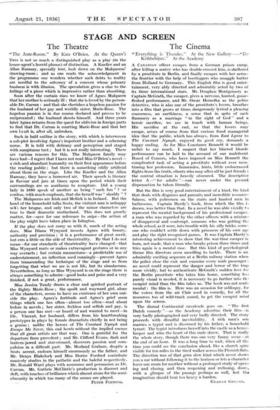STAGE AND SCREEN The Theatre
"The Ante-Room." By Kate O'Brien. At- the Queen'i
Tms is not so much a distinguished play as a play (in the house-agent's horrid phrase) of distinction. A Kneller and an Allan Ramsay, specially lent, look down on the Mulqueens' drawing-toom ; and as one reads the acknowledgment in the programthe one wonders whether such debts to reality are needful to the solvency of a concern whose primary business is with illusion. The speculation gives a clue to the failings of a piece which is impressive rather than absorbing.
Soon after the curtain rises we know of Agnes Mulqueen that her mother is seriously ill : that she is loved by the person- able Dr. Curran : and that she cherishes a hopeless passion for the husband of her gay and worldly sister, Marie-Rose. The hopeless passion is in due course declared and proves to be reciprocated ; the husband shoots himself. And three years later Agnes returns from the quest for oblivion in foreign parts to find that Dr. Curran is courting Marie-Rose and that her own Le2it is, after all, unbroken.
Such in bald outline is the story, with which is interwoven a sub-plot involving Agnes's impotent brother and a scheming nurse. It is told with delicacy and perception and staged with sumptuous tact ; but it is not really interesting. There are various reasons for this. The Mulqueen family may have had—I regret that I have not read Miss O'Brien's novel— a rich and abundant humanity on their first appearance before the reading public ; but there is something oddly artificial about them on the stage. Like the Kneller and the Allan Ramsay, they have a borrowed air. Their speech is literary in flavour and jars at times upon the period which their surroundings are so assiduous to recapture. Did a young lady in 1880 speak of another as being " such fun " ? or confess, with much emphasis, that she herself was " shoddy " ?
The Mulqueens are Irish and Mellick is in Ireland. But the head of the household talks Scots, the visitant nun is unhappy wit'l her brogue, and only two of the minor characters are true to their dramatic motherland. This does not greatly matter, for—save for one reference to snipe—the action of the play might have taken place in Islington.
If the play does not carry us with it, much of the acting does. Miss Diana Wynyard invests Agnes with beauty, authority and precision ; it is a performance of great merit, but errs a little on the side of theatricality. By that I do not mean—for our standards of theatricality have changed—that Miss Wynyard rants or makes extravagant gestures or in any way overacts ; but certain mannerisms—a predictable use of understatement, an inflection used cunningly—prevent Agnes from transcending the technique of the stage and us from forgetting that what we see is not life, but its simulacrum. Nevertheless, as long as Miss Wynyard is on the stage there is always something to admire—good looks and poise and a very finished, if not a great, performance.
Miss Jessica Tandy draws a clear and spirited portrait of the flighty Marie-Rose ; the spoilt and wayward girl, alone of the characters, seems to have an existence of her own out- side the play. Agnes's fortitude and Agnes's grief seem things which one has often—almost too often—read about before in novels ; her sister, feckless and selfish and gay, is a' person one has met—or heard of and wanted to meet—in life. Vincent, her husband, differs from his heartbreaking prototypes in plays by female dramatists chiefly in not being a genius ; unlike the heroes of The Constant Nymph and Escape Me Never, this cad howls without the implied excuse that all great artists are that way. One is grateful for the departure from precedent ; and Mr. Clifford Evans, dark and lantern-jawed and star-crossed, discovers passion and coin- pulsion in a difficult part. Mr. Morland Graham, despite a Scots accent, endears himself enormously as the father, and Mr. Denys Blakelock and Miss Dorice Fordred contribute masterly studies in the pathetic and the baleful respectively. Mr. Ronald Ward plays with assurance and persuasion as Dr. Curran. Mr. Guthrie McClintic's production is discreet and deft, with touches of brilliance which almost atone for the semi- obscurity in which too many of the scenes are played.
PETER FLEMING.






































 Previous page
Previous page